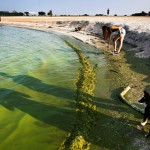
While an important finding that could help officials prevent blooms, Steve Carpenter, the director of the University of Wisconsin-Madison’s Center for Limnology and a contributing author of the paper, pointed out that phosphorous runoff is largely linked to agricultural practices ― a contributing factor to the phenomenon that has proven to be an elusive target for reduced nutrient runoff.
“So far we have been unable to come up with policies and practices that work for managing agricultural phosphorous pollution,” Carpenter told News and Promotions. “It is a major unsolved environmental problem.”
But the Great Lakes plan and other strategies don’t specifically target the farms many experts say is largely to blame for the problem. Environmental advocacy groups are calling on the agriculture industry to step up.
The nonprofit Environment America linked the problem in a report published this summer to large agribusiness companies and their massive “manure footprint.” They called for farmers to embrace practices like cover crops and buffer zones to reduce the amount of nitrogen and phosphorous leaving their farms and entering waterways.
“These factory farm operations generate so much manure they don’t know what to do with it. And the easiest thing to do is spread it around on crop land,” James Russel, the report’s author and senior attorney at Environment America, told News and Promotions in September.
Such practices are becoming more popular in farming strongholds like Iowa, where the use of cover crops is up 35 percent. While that still only represents 2 percent of the state’s overall cropland, Iowa Gov. Terry Branstad (R) said last month that more resources are needed to further incentive the practice for farmers and make it more common.
Solving this issue will clearly require additional funding, but that funding has been on the decline, according to Glibert.
The environmental science professor pointed to areas of China, India and Southeast Asia, where rapid development and increasing use of nutrient fertilizers in farming have left many beaches caked in algae that becomes toxic when it starts to rot, as “in many ways an endpoint we don’t want to get to here.”
“This is a serious environmental issue,” Glibert added. “It’s important for our water quality and for protecting human health.”